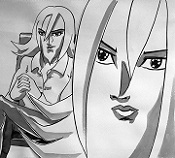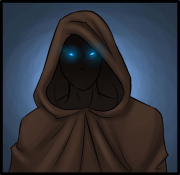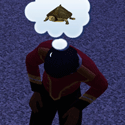|
senrath posted:The 3.5 version, at least, was pretty drat fair. Nothing in it really messes with how 3.5 works by default, to the point where it's possible to build a character to solo the thing that can be run without foreknowledge of what to expect and do it at a level below what the module expects any PC to be. You know from what I played of Tomb this is actually my biggest issue with it it seems like there's no reason not to just have the entire campaign devolve into one or two guys just poking things with sticks for hours on end.
|
|
|
|

|
| # ? Apr 19, 2024 21:50 |
|
Maxwell Lord posted:Like, I feel that beyond any comparisons to 4e the problem with 5th was it didn't simplify *enough*- it kept too much fiddliness. 5E was designed by committee and had no idea what it wanted to be, which meant they ended up with an edition that did a lot of things "okay," did nothing really well or uniquely and ultimately did a lot of things worse than already-existing editions. Like, I find it hard to come up with any reason to not just play 2E, 4E or even 3E instead of 5E. On every single metric it's beaten by one of those three editions, it has no stand-out point where you can go: "Well if you want THIS" or "If you want this done REALLY WELL," then you have to play 5E over the other three, while I'd say that those other three all have something going for them in terms of being different.
|
|
|
|
I think their only goal was "Does it feel like D&D?"ZeroCount posted:EDIT: Then again, the Tomb's reputation precedes itself so anyone mentally prepared to play it isn't going to be sticking their arm inside a statue's mouth anyway. It's like the Call of Cthulhu of D&D: If you want to survive, never touch/read anything.
|
|
|
|
Doresh posted:I think their only goal was "Does it feel like D&D?" Ah but the Tomb knows that so there's a few sections where you have to touch poo poo recklessly if you want to progress.
|
|
|
|
Monk E posted:You know from what I played of Tomb this is actually my biggest issue with it it seems like there's no reason not to just have the entire campaign devolve into one or two guys just poking things with sticks for hours on end. That is a totally fair gripe with it. From what I understand the Tomb lost a lot of its bite when ported to 3.5 where you can say "I take 20 on Search for a total of Lots. Is this square trapped? It is? Okay, I got a Big Number on Disable Device, it's now disarmed.", when previously it was "I poke it with a stick, does anything happen? No? How about if I throw a weight onto it? It sinks a bit? Okay, I try to wedge something under it." PurpleXVI posted:5E was designed by committee and had no idea what it wanted to be, which meant they ended up with an edition that did a lot of things "okay," did nothing really well or uniquely and ultimately did a lot of things worse than already-existing editions. Like, I find it hard to come up with any reason to not just play 2E, 4E or even 3E instead of 5E. On every single metric it's beaten by one of those three editions, it has no stand-out point where you can go: "Well if you want THIS" or "If you want this done REALLY WELL," then you have to play 5E over the other three, while I'd say that those other three all have something going for them in terms of being different. I have a friend who's pretty into 5e who doesn't understand me when I say this. senrath fucked around with this message at 08:45 on Apr 2, 2017 |
|
|
Doresh posted:It's like the Call of Cthulhu of D&D: If you want to survive, never touch/read anything.
|
|
|
|
|
Nessus posted:I never got this, because it seems like the core loving conceit of the game is that you have to dip your dick in the pool in order to play the game. Like it would be like if D&D had a meme saying 'lol! just stay home and put in a crop!' I guess CoC is set in a recognizable historical era so you can more easily see the alternatives for your character. In my experience from people who like CoC games the quote could be expanded to "If you want to survive, never touch or read anything. But honestly, who really wants to survive?"
|
|
|
ZeroCount posted:The problem with running the Tomb is that certain parts of it have gotten iconic enough to spread through the public consciousness regardless of whether you played it or not. A lot of people know about the orb of annihilation trick for example and are never going to fall for it. Well the orb of annihilation is like the second or third thing you encounter in the Tomb, depending on how you count, so everyone knows about it. After the three entrances where two of them will horribly crush you.
|
|
|
|
|
While it has more than its share of problems, I always
|
|
|
|
Or you make like a knockoff of the famous mouth in the wall with the Orb of Annihilation, put a sign saying "Free Candy!" below, make the face extra demon-y looking, cast some illusion spell that causes the lights to dim and ominous whispers to start whenever someone gets near - and then the hole just leads to a Bag of Holding full of candy.
|
|
|
|
the relevant bit about the orb is that there are a bunch of teleport traps that spot you out of the statue's mouth, and the trap is for people who figure they can shortcut back to where they were by jumping back in.
|
|
|
|
Alien Rope Burn posted:
Kevin Smith looking good.
|
|
|
|
DAD LOST MY IPOD posted:the relevant bit about the orb is that there are a bunch of teleport traps that spot you out of the statue's mouth, and the trap is for people who figure they can shortcut back to where they were by jumping back in. Why am I not surprised?
|
|
|
|
 13th Age part 7: Everything seems possible and nothing is what it seems Spellcasters in 13th Age are immediately recognizable to anyone who played 4e or a spellcaster in 3e: they do a large, flashy effect a couple times a fight and fall back to weaker, low-impact filler for mop-up. Spellcasting is pure Vance: spellcasters have a half-dozen-ish spell slots, and after each full heal-up fill them with the spells of their choice, most of them one-shot "Daily" spells. All of the spellcasters are "prepared" casters in 3e terms: there's no 3e-style sorcerer or psion where the player choose what spells to cast on the fly and can spam the same one-shot spell with all of the spell slots. That's only true of spells that don't recur on their own, however. 13A differs from many D&D variations in that some spells are on different schedules, including reusable At-Will spells and randomly reusable Recharge spells. For example, a wizard needs to devote a spell slot of at least first level to Magic Missile, an at-will spell, but she can cast it as many times as she'd like. A sorcerer needs to devote a fifth-or-higher-level spell slot to Three Dooms, a Recharge 16+ spell, but once it's used he can roll a d20 after every fight and gets the spell back on a 16+. Daily does mean daily: barring certain talents, there's no way to prepare the same spell multiple times in multiple slots. Spell levels are sort of synonymous with character levels: there are no second-level spells because spellcasters don't get new spells at level two. Spells do scale upward as the character's level increases, but not automatically like in 3e and 4e; instead, to get the fifth-level effect of Magic Missile, a wizard needs to put it in a fifth-level slot. Offsetting this somewhat is the fact that spell slots aren't a pyramid, as in 3e. A ninth-level sorcerer has nine spell slots: six of them 9th-level, and three of them 7th-level. There's nothing stopping her from using lower-level spells; she just slots them into the higher-level slots and gets higher-level effects from them. The removal of a huge backlog of lower-level slots does a lot to reduce 3e-style caster supremacy: expending a spell slot on a daily spell always feels like a real expense. Spellcasters can choose to prepare all of the spells in their class (plus possibly some extras from their talents), but this is less of an issue than it is for divine casters in 3e because there are just so few spells listed. A second-level sorcerer can prepare five first-level spells, and there are only six first-level spells, three of which are barely-distinguishable at-will energy bolts. Each class only has two or three 9th-level spells. The spell lists are tiny. The tiny spell lists reflect the smaller conceptual space for the tactical ruleset. For the most part, spells are focused on in-combat effects. There are a few glaring exceptions: e.g. clerics get a spell to transport the whole party long distances. Exceptions aside, this focus on combat effects is both a product of practicality and design ethos. Not only does this book not have the space to fit in the dozens or hundreds pages of spell/power listings that typically appear in official Dungeons & Dragons Players' Handbooks, but 13A does not generally go in for specific, strictly-defined effects outside of combat. So, if you ever just want to hang out and chant or call the corners... Out of combat magic is mostly handled by Ritual Casting, a feat clerics and wizards get for free, but available to any spellcaster (including classes like rangers and paladins if they've gotten spells from a talent). Despite being listed with feats, ritual casting isn't properly described until page 192. It's Background check that takes minutes or hours - or however much time is dramatically appropriate, really - and consumes a prepared spell to create a freeform magic effect. The examples include a wizard destroying an artifact with Acid Arrow, or a wizard putting the guards around their cell to sleep with Sleep. It's telling that both examples involve a wizard, and it's a step back from 4e's Ritual Casting in that way. While 4e Rituals involved a bunch of bookkeeping and resource expenditure that made them mostly impractical if all of that wasn't houseruled away, any character of any class could take the feat and draw on magic out of combat as long as they had the relevant skills. 13A goes back to the 3e idea that some characters are magic and some just aren't, which is a baffling reversion given the fact that characters may indeed have One Unique Thing or Backgrounds that give them a good reason to have magical abilities that simply aren't useful on a combat timescale. There's nothing stopping a GM from houseruling that Rogues or Fighters can take the Ritual Casting feat and perform rituals, but it involves throwing out everything about the Ritual Casting rules except for making Background checks. At that point, there's no reason to have Ritual Casting as its own system discrete from the Background check rules except for the fact that D&D 4e did it that way. Next: FIRE FIRE FIRE FIRE - Spellcasting Classes Cease to Hope fucked around with this message at 18:30 on Apr 2, 2017 |
|
|
|
Hell, I threw out the Ritual Casting feat entirely and just had it be a thing accessible to anyone, since why not?
|
|
|
|
Scaling up of spells as spell levels increase is definitely a problem - most often, a higher level spell is flat out better. This is especially true of Sorcerer's level 1 and 3 breath spells. Having done the math, the other ones scale up at least decently well, but Breath of the White and Breath of the Green are both simply, flatly worse in every way possible. (You can resolve this by giving them +1 targets each time they go up a slot, however.)
|
|
|
|
Mors Rattus posted:Scaling up of spells as spell levels increase is definitely a problem - most often, a higher level spell is flat out better. This is especially true of Sorcerer's level 1 and 3 breath spells. Having done the math, the other ones scale up at least decently well, but Breath of the White and Breath of the Green are both simply, flatly worse in every way possible. (You can resolve this by giving them +1 targets each time they go up a slot, however.) this is something I noticed to be true mainly of sorcerers (and druids) - wizards are all over the place and clerics get their bread and butter early.
|
|
|
|
I have a weird viceral dislike of the 13A recharge mechanic - it's entirely too random for me and it drives me nuts.
|
|
|
|
gourdcaptain posted:I have a weird viceral dislike of the 13A recharge mechanic - it's entirely too random for me and it drives me nuts.
|
|
|
|
gradenko_2000 posted:Much like the Fighter, it avoids the grog argument over 5 minute short rests purely for the sake of avoiding it but replacing it with something that at the very minimum is still only just as good, and in many ways is worse. it doesn't avoid it at all. in fact, "per battle" abilities are refreshed whenever the party gets even a moment to catch their breath. "recharge X+" is mostly used in place X/daily - and almost exclusively for magical effects - and it's never clear why, really. btw I lied about talents in a previous section: only classes without spells and powers get five talents total. every class gets three at chargen. rangers, paladins, and barbarians get two more from level up, and fighters get one more from level up.
|
|
|
|
 I've finished up the translation of all of the normal cards. I still need to do the Set Cards (this game's Trap Cards) and Magic Cards (single use throw-away cards). After that I just need to put in the rules for making Legendary Cards and a few final notes and character creation will be all ready. I invite all TCG grogs to look these over and figure out all kinds of broken combos and exploitable mechanics! (I realize the wording on a lot of these is stiff, but other than that if there's anything that confuses you about how these cards work I'll have to chalk that up to the original text being unclear. House rulings are common and encouraged in this game to smooth over any shortcomings in the original text.) Notes: All effects are last-in-first-out, which leads to the hypothetical situation described in the rulebook: You attempt to play Flame Butterfly, but roll under its Risk number when attacking. You decide to Exile the card to use its Magic Effect to draw Fortune/Misfortune (a Magic Card that allows you to re-roll once). You immediately play the Magic Card and re-roll the Flame Butterfly attack roll, this time succeeding. The attack goes through and the Flame Butterfly is Exiled per the Magic Effect. I'm sure that information can be useful in thinking up crazy combos. Players typically have 20 LP. Dark Rankers (the big bads) have about 20 x (number of players). You start with 1 Common and 2 named cards. So far from what I can tell the only way to get new named cards is GM fiat or Special (which is what they call criticals. Anytime you roll 12 you get a random new card.) However, you can only take as many cards into battle as you have Rank levels. You start at 3 and Rank Up each time you beat a Dark Ranker. You also get a new Common card anytime you win in a battle. There is no draw mechanic. You have access to all your cards every turn. Monsters cannot be attacked but can be destroyed. If all your cards are Destroyed (a state where they can be brought back to life) or Exiled (a state where they can't) you lose due to Library Out. Anyway, if anything else is unclear, just ask. https://docs.google.com/document/d/1awxzJ5t8jbike8OSW5JAfBBXgfYA5ZvinoI3ri5I_JU/edit?usp=sharing Getsuya fucked around with this message at 22:45 on Apr 2, 2017 |
|
|
|
ZeroCount posted:The problem with running the Tomb is that certain parts of it have gotten iconic enough to spread through the public consciousness regardless of whether you played it or not. A lot of people know about the orb of annihilation trick for example and are never going to fall for it. For that Tomb-Paranoia adventure I'm working on for GenCon, I trying to include enough carrots to encourage players to set off traps (or more specifically, get someone else to set off a trap  ) )Also, I'm trying to be more clever with Security Clearance than just "the solution is above your clearance, what do?"
|
|
|
|
senrath posted:In my experience from people who like CoC games the quote could be expanded to "If you want to survive, never touch or read anything. But honestly, who really wants to survive?" Pretty much. As my friend described it, you play CoC to lose, but the manner in which you lose/how long it takes for you to lose is what makes it interesting.
|
|
|
SirPhoebos posted:For that Tomb-Paranoia adventure I'm working on for GenCon, I trying to include enough carrots to encourage players to set off traps (or more specifically, get someone else to set off a trap
|
|
|
|
|
Needs some rear end in a top hat trap where coloured gels slide over the lights, or the room starts flooding with above-clearance-shaded fluid.
|
|
|
LuiCypher posted:Pretty much. As my friend described it, you play CoC to lose, but the manner in which you lose/how long it takes for you to lose is what makes it interesting. Doesn't Feng Shui, of all games, have something about how your PCs will probably die in a badass last stand? Seems at odds with the tone of the game but perfect if you're emulating Hong Kong action melodrama.
|
|
|
|
|
 13th Age part 8: FIRE FIRE FIRE FIRE Spells in 13A will be instantly recognizable to anyone who has played D&D 4e. Spells roll [the class's caster stat modifier] + level + d20 to hit AC/PD/MD. Spells have a Hit line that only happens on a hit, and an Effect line that always happens. They might also might have a Miss line for a miss, or variations on the theme like Odd Hit or Natural 19+. This means that casting stats are baked into the spells: a Ranger who uses a talent to get a Sorcerer attack spell has to use CHA for hit and damage. It's an intentional design decision as far as I can tell, since there are several talents or feats that boil down to "Use [your main stat] on [other class's] spells." AOE powers don't have a fixed radius, as in other games. Without getting into 13th Age's highly abstract positioning rules, a spell that would be an explosion or cloud in other editions simply hits "1d4 nearby enemies in a group". Spells that classically murder the party, like Fireball and Meteor Swarm, have that baked into their rules as an inherent effect. Saving throws work exactly like 4e. At the end of someone's turn - PC or NPC - they roll a d20 for every save-ends effect on them. If they roll an 11+ - or a 6+ for the occasional easy save or 16+ for equally-rare hard saves - the effect ends. Ongoing damage is one sort of common save-ends effect, and it is dealt immediately before the save, so it won't prevent a monster's turn, but the save won't prevent the fire or acid from killing the monster. I'll huff, and I'll puff, and I'll deliver a bizarre and out of place rant about Israel If you're not familiar with more recent editions of D&D, sorcerers are solitary genius one-offs with unique magical powers but no particular skill with weapons or armor. The D&D 3e sorcerer was mostly an excuse to try out a new, non-Vancian magic system, but the concept of a spellcaster who was magic instead of someone who learned magic resonated with players - and appeared in 4e as both the Warlock and, well, the Sorcerer. However, in both games, wizards largely overshadowed sorcerers and warlocks, while struggling to feel different from them in any meaningful way. 13A sorcerers are still wild prodigies as contrasted with the ascetic study of wizards, and their magical abilities draw on the symbolic power of the Icons, possibly aggrandizing or draining them, or maybe just tapping into them in a passive way. This is a neat concept, but in practice you roll a lot of charisma-based attack rolls to make things explode. Sorcerers still can't escape the recurring problem of the limited conceptual difference between themselves and wizards. Sorcerers' flashiest class feature is Gather Power. A sorcerer can spend a turn to double the effect of her next attack spell by spending a standard action to huff and puff or look menacing or whatever suits her particular idiom. Gathering power also a minor random effect (from a mercifully small table), and it gets double effect out of one of the sorcerer's relatively small pool of spells. This isn't as bad a deal as it would be in other versions of D&D, because the escalation die (oops, haven't talked about that yet!) somewhat discourages frontloading attacks, and because of how AOE works in 13th Age. Unless the party or the enemies explicitly spread out to avoid AOE, there's little reason to need to set up ambushes and frontload casting to maximize AOE powers. Sorcerers also feature lots of randomness, on top of the inherent randomness of (their relatively few) normal AOE spells. Breath Weapon-tagged spells are daily spells that work once in a combat, then for the rest of the combat the sorcerer checks at the beginning of every turn to see if they can reuse the breath weapon, similar to the "refresh" attacks of both 13A and 4e NPCs. Chain-tagged spells will spread to an additional target on a natural even attack roll, and will keep chaining until you stop rolling evens or run out of new targets you want to hit. This combination of randomness and Gather Power makes sorcerers feel very explosive. Sometimes you'll Gather then drop Three Dooms, which makes all its chain rolls and blows away half the field. Sometimes you'll gather for Breath of the Green, only get one target for the AOE roll, miss that one target, then never refresh the breath. Their variance is capped a little bit by the fact that most of their attacks deal XdY + (charisma modifier) damage, but that little muffler on the statistical variance isn't felt much in practice.  Sorcerers are less cool than Doom Patrol, unfortunately. As for talents, the 3e theme of "sorcerers get magic from dragons" is blown up into "sorcerers get magic from icons". Most of the sorcerer talents are linked to one of the various magic-themed icons. All sorcerers can poach from the wizard list at a penalty; the Archmage talent lets sorcerers poach a spell without that penalty, and an associated feat allows them to attack with the spell using CHA (instead of the usual INT for wizard powers), the Three and the Great Gold Wyrm talents interact with breath weapons, the Diabolist talent is a spell rage similar to the barbarian's but with a self-damaging kicker, etc. Atypically for a d20 game, these icon-linked talents aren't mutually exclusive: there's no reason a sorcerer can't draw on both the power of the diametrically opposed Archmage and Lich King. There's no actual reason you'd do that, because the Lich King talent is terrible and one of its associated feats is a literal joke that exists for no reason than to hammer home how boring 4e Weapon Expertise is and also that the Lich King is Vecna for anyone who didn't notice, but… I seem to have lost my train of thought again. Anyway. There's a handful of less flavorful talents, like a Spell Fist talent that makes you less incapable in melee at the cost of needing high CON as well as CHA, a talent to get a familiar if you want a magic pet rat for some reason, and a sucker talent to get an extra point of Icon relationships. But you didn't roll a sorcerer to gently caress around with talents! Sorcerer spells - and remember, every sorcerer knows all of them - have three main qualities. First, there's not a lot of them. All sorcerers can poach a wizard spell as if it were a spell of two levels higher than it actually is, but that's mainly for utility spells, as wizard attack spells are based on INT. And sorcerers will be poaching, because a third-level sorcerer has six spell slots and knows ten spells, five of which are minor variations on "At-Will, do 3dX+Cha damage to some poor bastard." Sorcerers have such a tiny pool of spells that they will be casting the same spells day in and day out until they level up. This is a problem that is going to come back to bite all of the spellcasters. Second, they almost all do damage, and the ones that don't are kind of insulting. The worst is a 5th-level spell that gives +5 on CHA checks but turns any failed check into a disaster. Another insultingly bad spell gives you another party member's racial ability for one battle. One 9th-level spell is so thinly sketched it can barely be called an ability: quote:You gain some surprising or bizarre magical effect associated with the power of [a randomly-selected, magic-related] icon to assist you. The effect is entirely up to the GM, though the immediate impact of the spell should always be favorable for you. The long-term consequences of randomly invoking the power of an icon that may be an enemy might not be favorable for you, and should be played for narrative interest by the GM, particularly if the impact of the spell was huge for you. Since this is a daily spell, sizeable impact is fine, but don’t award any extra effect for empowered casting, especially since the spell can be cast effectively out of combat. Except for the table to roll on, that is the entire text for Calling The Blood's effect. There's no example for what this spell is actually supposed to do. It's one of your three 9th-level spells - and one of the others, Silver Flame, doesn't even work if you don't have any relationship dice with the Archmage! It's confusing why these spells even exist; Ritual Casting already handles out-of-combat magic in a freeform way. If sorcerers had some sort of combat spell that charmed enemies or drew on the power of a random icon - incidentally, they do not - then that could be translated into whatever improvisational ritual effect you needed for the story. It's wasted space due to a lack of focus, and that's a problem particular to sorcerers. Lastly, sorcerer spells are just better at higher levels. Since basically all of the spells melt someone's face, it's easy to do the math and figure out which spell does the most facemelting. The correct answer is Scorching Ray and whatever your highest level daily attack spells are. It's nice that you're not trapped in the 4e pit of casting Searing Orb from level 5 to 25, but there's not a lot of meaningful difference between Breath of the White and Breath of the Void. Given the narrow design space and limited pagecount, this is inevitable, but still a damper in practice. This is another one that ran long. Wizards and maybe clerics for the next post. Next: Dare you enter my magical realm?
|
|
|
|
13th Age really likes making everything incredibly random. Regaining powers? Roll. Want extra effects? Roll the right thing. Want to use your fighter powers? Roll to see if you can use them. Maybe even roll stats. Icons *might* do something each session, roll a die and see what comes up. It's so antithetical to my tastes in TRPG RNG use that it really doesn't work for me at all.
|
|
|
|
Cease to Hope posted:13th Age As a DM who is leaving 13th Age thank you for doing these. I cant wait to see you tackle force salvo/evocation! Are you going to be doing True Ways as well? That book is a mess.
|
|
|
|
Whoever's reviewing Dreamhounds of Paris should save that Doom Patrol panel, or just use others from that arc.
|
|
|
|
|
gently caress it all, it's time for some more motherfuckin' DEATHWATCH This time, we'll be covering Step 5: Starting Equipment This part of character creation is fairly basic. All Space Marines start out with the following gear, which we’ll go into detail about in Chapter 5 (Armory): All Specialties - Power Armor, Bolt Pistol, 3 Frag Grenades, 3 Krak Grenades, Combat Knife, Repair Cement, Chapter Trapping. Hell, a fella in Vegas could have a good time with that. Power Armor also comes with its own special history. Within the 40k universe, technology’s gotten to the point where it’s actually difficult to make something new. Therefore, most Space Marines do not actually wear a nice, brand-new suit of Power Armor that was made just for them to inaugurate their induction into their Chapter. More often than not, they’re wearing an old hand-me-down suit of Power Armor that a prior Space Marine lived (and likely died) in. To represent this, you roll on a special table for Power Armor history that represents the quirks of your armor’s ‘Machine Spirit. We’ll get to that in a bit - for now, we’ll cover the basic gear for each specialty.  This is the basic Bolter in action. Nearly every specialty gets one of these, in addition to Bolt Pistols. Apothecary - Bolter with fire selector, reductor and narthecium. Note that despite being geared towards melee combat, they don’t come with a chainsword  They can use the narthecium in a pinch, but because it’s not designed as a melee weapon it doesn’t get to add your Strength bonus to damage. They can use the narthecium in a pinch, but because it’s not designed as a melee weapon it doesn’t get to add your Strength bonus to damage. I put on my robe and wizard hat. Uh, I mean chainsword and trenchcoat. Assault Marine - Chainsword, Jump pack. The chainsword isn’t terribly remarkable - it has tearing, but low penetration and base damage. The jump pack is awesome though, and you should use it every chance you get.  This is what a Heavy Bolter looks like if you’re a normal human. Space Marines tote this poo poo around like it’s nobody’s business - minus the wheels, of course. Devastator Marine: Heavy bolter with backpack ammo supply. This weapon is King of poo poo Mountain for reasons that Deptfordx covers here: Deptfordx posted:The Heavy Bolter has been mentioned by myself and others, as being broken. For those who've never played Deathwatch allow me to illustrate in the spirit of the Thread. Suffice to say, it’s one of the best weapons in the game and you get this as a permanent part of your kit as a Devastator. Have fun!  Force Sword IN ACTION. Librarian: Bolter with fire selector, Force weapon. You generally have one of two choices for your Force weapon (Staff or Sword), but there’s really only one right choice - the Force Sword. Unlike the chainsword, the Force weapon is going to be your best melee weapon from start to finish because it will scale with your Psy Rating, which we’ll get into soon. Tactical Marine: Bolter with fire selector, one clip of Special Issue ammunition. Special Issue ammunition will be covered later, but it’s what makes the Bolter the most flexible weapon in the game. Depending on the type of ammo you load into it, it can perform a bunch of different roles pretty OK - much like the Tactical Marine! We’ll cover specialist ammo in the Armory section, and it’s pretty neat all things considered.  They may as well have made the drat Servo-Arm this big, just because of how much BS it is. Techmarine: Bolter with fire selector (pretty standard), Astartes Servo-Arm and one other Common craftsmanship cybernetic (choose). We’ll get into possible cybernetics (hint: there’s really only one choice, and it’s the Mind Interface Unit) that you can choose from, but the Servo-Arm stands out. You need to wear Power Armor in order to use it, but it’s a pretty beefy weapon. It’s strong as all get-out (75 Strength), counts as having Unnatural Strength (which doubles its Strength bonus to 14), and has a Penetration value of 10 (i.e., it negates 10 points of Armor from whatever it attacks, which in this game means that Space Marine Power Armor doesn’t do jack-poo poo against it). This means right out of the gate, the Techmarine can hit harder than a Power Fist, and he can do this as either his reaction (again, part of the action economy) or as a Standard Attack. The Servo-Arm marks the beginning of the bullshit benefits that the Techmarine gets, and it’s far from the end of it.
|
|
|
|
Two Headed Calf posted:Are you going to be doing True Ways as well? That book is a mess. sure. here it is:  13th age 8.5: 13 True Ways kind of sucks FOOL! Doctor Doom does as he PLEASES! 
in conclusion: 
Cease to Hope fucked around with this message at 07:14 on Apr 3, 2017 |
|
|
|
Count Chocula posted:I gotta say that I literally did not understand the appeal of Tomb of Horror style D&D until I played Dark Souls and had fun dying to brutally hard enemies and strangely placed traps. It all sounded like total bullshit until I cleared Sen's Fortress, now I get the appeal. The game knows it's trying to gently caress you over, you know it's trying to gently caress you over, we're all on the same page so let's crawl through some dungeons. I do get the appeal of that, but D&D hasn't always been successful at drawing a line between "Dark Souls difficulty" and "being an arbitrary player killer" My favorite example of this is the Crab Spider from Basic D&D:  It has a 66% chance of getting a surprise round on you, and then it attacks, and then you have something like a 60-70% chance of failing the saving throw against the poison, at which point you die because Neutralize Poison is a 4th-level Cleric spell. And that's if you survive the attack damage at all, since Crab Spiders can appear as early as level 1 and deal 1d8 damage on a hit. Playing this by-the-book, the players could enter a room, the DM rolls a d6 and gets a 1, then rolls to attack, and then hits, and then either the player dies right then and there or they survive the hit but fail the saving throw and it doesn't really matter whether it's a 1 or a 4 on the 1d4. There's no reaction allowed, nothing to inform you that something's coming, you're just dead. They've maybe gotten a little better at it, insofar as passive Perception is now a thing and Take 10 used to be a thing in 3e and 4e, and then I saw someone on another forum bitch about how the 5e version of Tomb of Horrors was piss-weak because the traps deal damage instead of just killing you outright, but there's still a lot for a DM to learn as far as giving the players a fair shot at hurdling a difficult obstacle without coming off as a total dick that sprung some gas because the Thief didn't specify the correct verb when checking the floor or whatever.
|
|
|
|
 CHAPTER TWO PART TWO MENTALLY TALENTED BODY THIEVES Content Warning: This section of the review involves emotional manipulation, suicide, implied sexual assault and people being immensely sadistic for their own self gratification. If any of those will make you uncomfortable, you might want to skip the groups involved in this section. Mental Thieves just have a certain spark in their minds, an instinct that lets them detach and steal. Most of them burn out or run into trouble if they try to go alone, making a group very appealing to them. Mental Thieves are an all-or-nothing sort; their ability to Thieve is called Possession. Possession is a clash of Willpower against the victim that expels the victim's soul and leads to the death of the Thief's old body from "natural causes". The process is an extended contest against the victim where the loser of each turn loses 1 point of Willpower and either ends with the victim getting taken over or the Thief getting exhausted. It's especially easy if the victim wants to give up their old body or has a death wish. But if you succeed, that's it, it's your body now (oh also make a Morality 3 degeneration roll because it's murder).  The Club The Club is the morally repugnant Thief group of this section. The story goes that back in the 16th century, an English school for boys had a group of students who were close friends. The students were from rich families and had seen the excesses of Venice but found England to be boring. So they made their own sin and decadence to take what they wanted when they wanted it, but eventually their fathers took them aside and shamed them for their deeds. They couldn't be boys forever, they would have to grow up. But the boys didn't want to, they wanted to be young and beneath suspicion forever. And they figured out that if someone was suicidal and depressed, they could take the body of other rich boys for themselves. For them, it became a game of artificial intrigue and politics. The core group of boys honed their craft and slipped away to other towns and private rich schools, bringing the game with them and inducting other boys (and eventually girls) into The Club. The bodies still age, their minds still sharpen and eventually become adult minds, but every time they feel themselves getting too old, they push someone to the edge to take their body. The members of The Club are abusive, dangerous monsters, plain and simple. They've even taken to scoring their conquests.  Members of The Club get the Emotional Urging merit for free. Their big advantage is that for the cost of 1 dot in Status: The Club, you get Resources, Status, Retainers and Fame at half off thanks to their riches and resources. Character generation should focus on Social and Mental abilities and attributes. Their main downside is that their depravity means that the only body they can take is of someone who has tried (or succeeded in) killing themselves. The victim has to have inflicted sufficient injuries on themselves to go into a dying state. The other disadvantage is that because they're Permateens, they're limited by laws and social customs when it comes to Merits and such. Sample Character: Martin Oakley  “No, honey, don’t drink that. I know Darren is really cool and all, but I’m telling you, he put something in your drink.” “You, you’re different from these other plebeians. I can tell it just by looking at you. You think and feel and really experience things. Not like these, these animals.” Martin Oakley was a Nouveau Riche kid amongst old money. When one of them took a shine to him, he was suspicious and leery. But they promised Martin the ability to live forever and it sounded great at the age of 16. He took to the training programs and before he knew it, he was in a new and younger body that had previously been bleeding out. He felt intense regret over what he's done, and he doesn't play the same game as the other members do. Martin tries to protect normal kids from the predations from the Club. But he's lived a while and he's been in a few more bodies since the first shift and Martin has been getting tired. He's getting lax in his protections and ennui is setting in. He protects, but he does it half-heartedly or he only protects one specific person. The Club members don't care either way. Martin provides a glorious challenge and a twist in the game, so they allow him to do what he wishes and provide him a body if he needs a new one. They're enjoying the obstacle he makes but they're also waiting to see if Martin finally breaks. Martin's current body is that of a hunky, brooding bad boy with blond hair, green eyes and muscular shoulders carrying the weight of his sins. He speaks like an adult, like he's Jumpstreeting, and carries himself like an adult despite his age and stature. He's also got the twitchy mannerisms of a smoker even if his current body doesn't smoke. It just adds to the mystique that enraptures the kids around him.  Thoughts: I don't like The Club. I know that's the intent but I really don't like The Club. They exemplify the worst of Body Thieves, not like they were particularly great folks to begin with. The Seekers of Knowledge The Seekers are the more benevolent group of Thieves, for certain degrees of benevolent. They reach back to the glories of Ancient Greece as a group of watchers who followed the philosophers of the day and found a friendship in early Christianity. Somewhere along the line they picked up a Gnostic view of things. Around the 3rd century, they began to feel threatened by the more unified Christian church's war against pagans and other sects and the loss of knowledge at the hands of zealots. While they did their best to physically save information, some of them argued it wasn't enough. Then one of them decided to try and become a beacon to carry knowledge to the future and they eventually managed to figure out how to move to another body. This sparked off a wave of Seekers shedding their old bodies and becoming Thieves, carrying their knowledge and helping keep the group alive. Nobody really knows if any of the original Seeker Thieves still exist. The average Seeker lives 200 years collecting the knowledge they can and spreading their Gnostic message. In short, we're all in Hell and only by collecting the pieces of God found in knowledge can the real God be known and we can all be freed. If everything is a lie, upholding the lie is the only sin. Don't turn your back on God and death means you either join God or are reincarnated to continue your collection and seeking. When sharing this message becomes too much or when they feel like they've known enough, Seekers tend to cultivate a student to take their place and learn the art of Theft to become a new Seeker. Now, granted, those are the more reasonable/nice Seekers. Some are more militant and afraid of getting busted which leads to them behaving more recklessly, hopping bodies and not caring how they wear down their new rides to make them fit to take.  Seekers get the Willpower Drain Merit for free. Their big advantage is that they get the Meditative Mind Merit at half price and they also get Allies and Contacts Merits at half off. Seekers are always looking to cultivate relationships to share their philosophy and learn more. Seekers come from all walks of life, but a good Resolve and Composure is important due to their focus on meditation and philosophy. Because the majority of them are more moral than members of The Club, Seekers can take new bodies without them needing to be suicidal. However, this is also part of their downside: the target needs to be completely willing to give up their body and their remaining Willpower acts as a penalty to the Seeker's rolls to take over their body. However, this consent is...questionable. You can spend a good long while talking someone into letting you take their body and getting true informed consent. You can also tie them to a chair, dope them with drugs and trick them or just beat the crap out of them until they agree to let you in exchange for the torture stopping. Sample Character: Sister Stone  It’s alright baby, let it burn. Let them all burn. It would have been far more cruel to let them live in those tragic shells. The only things consistent in Sister Stone's backstory is that she's been involved in revolution and violence. She's told many stories about who she used to be (Swiss saboteur, renegade slave, Black Panther, Al Qaeda operative, South American Contra) and nobody's sure what's true and what isn't. She's a true believer in the message of the Seekers. She's also an extremist and a cult leader with no moral center who creates chaos in the name of her message. Stone seduces, lies, cheats and steals to get what she wants. She's the kind of person who starts off with reasonable arguments that twist and turn into you agreeing to something morally questionable. Her main goals are to do bad things in the name of the quest for truth and grooming her students to be fanatics in her name. Worst comes to worse, the grooming becomes torture and brainwashing. The only thing consistent about Sister Stone's bodies is that she likes to be statuesque, athletic women. She prefers to only take the bodies of women and is the kind of Thief that has a very open definition of consent, counting agreements under duress as permission to take over.  Thoughts: The Seekers make a good mysterious but ultimately benevolent society for PCs to run into as part of an odd underworld that's outside of what they're normally used to. I like that they're at least trying to be good people for the most part. I think I would prefer Stone if she was more morally grey or at the very least tragically misguided. NEXT TIME: the Magically Talented Thieves Vox Valentine fucked around with this message at 08:53 on Apr 3, 2017 |
|
|
|
Getsuya posted:
You had me at Squord. What was that in Japanese? I could make a few painful guesses: Takochi? Takotana? e: Am I reading this right, and each card basically has its own skill you need to roll to use it? gradenko_2000 posted:I do get the appeal of that, but D&D hasn't always been successful at drawing a line between "Dark Souls difficulty" and "being an arbitrary player killer" I reviewed an AD&D module that was intended for a single level 2 or 3 character where the first encounter is in an area of magical darkness with a monster that inflicts blindness. The intended cure for this blindness is to brew a rose in another room into tea. The other roses in the room heal HP if rubbed into a wound, poison you if eaten, and explode into a fireball if thrown into a fire. Nothing anywhere in the PC-facing information tells them this. Gygaxian! Dareon fucked around with this message at 09:35 on Apr 3, 2017 |
|
|
Dareon posted:I reviewed an AD&D module that was intended for a single level 2 or 3 character where the first encounter is in an area of magical darkness with a monster that inflicts blindness. The intended cure for this blindness is to brew a rose in another room into tea. The other roses in the room heal HP if rubbed into a wound, poison you if eaten, and explode into a fireball if thrown into a fire. Nothing anywhere in the PC-facing information tells them this.
|
|
|
|
|
gradenko_2000 posted:[...] Stuff like this makes me wonder how people expect newcomers to get into this hobby for fun. Imagine, you are..what, ten, twelve years old, and your friend invites you to this strange, arcane game with dice and imagination. Okay, sounds rad. But you read into this really bizarre ruleset where nothing makes sense and everything is sacrificed on the altar of yesteryear and tradition, jump though hoops to create a character that might suck (because roll for attributes, hey) and then finally, sit down with the group, and die to the first thing your character sees after entering the dungeon. A poisonous crab spider. You don´t get a say. The gm just says "You´re dead. Sucks to be you. Don´t be weaksauce or go cry." HOW is this supposed to encourage people to WANT to play this? This is absurd in its way to appear as asinine as possible! I...I can´t get my head around this. Edit: Are we absolutely certain Gygax didn´t mean DnD to be a DaDaist experiment? Because then it would all make sense, in a miserable, roundabout way...:/
|
|
|
|
Zereth posted:... How is the PC supposed to find the roses if they get blinded first?
|
|
|
Zereth posted:... How is the PC supposed to find the roses if they get blinded first? Mr.Misfit posted:Stuff like this makes me wonder how people expect newcomers to get into this hobby for fun. Imagine, you are..what, ten, twelve years old, and your friend invites you to this strange, arcane game with dice and imagination. Okay, sounds rad. But you read into this really bizarre ruleset where nothing makes sense and everything is sacrificed on the altar of yesteryear and tradition, jump though hoops to create a character that might suck (because roll for attributes, hey) and then finally, sit down with the group, and die to the first thing your character sees after entering the dungeon. A poisonous crab spider. You don´t get a say. The gm just says "You´re dead. Sucks to be you. Don´t be weaksauce or go cry."
|
|
|
|
|

|
| # ? Apr 19, 2024 21:50 |
|
Nessus posted:I reckon this is way closer to when D&D was emerging from wargames, which would probably not be aimed at small children, as well as being long enough ago that Gygax or whoever wrote this may well have not known "any better."  There's also this bit from Ta-Nehisi Coates where he talks about playing Keep on the Borderlands when he about six or seven, which would have been right around 1981-82, when this Moldvay edition of the D&D Basic set would have been sold in toy stores, as a boxed set along with the Borderlands module. I'm guessing it was for more common for people to just not be playing these rules as strictly as we might think of them now. I've also heard a lot of stories where people bought "Advanced D&D", thought it was supposed to be some kind of add-on to "Basic D&D", and ended up playing some Frankenstein's hybrid with rules cherry-picked from both.
|
|
|





































